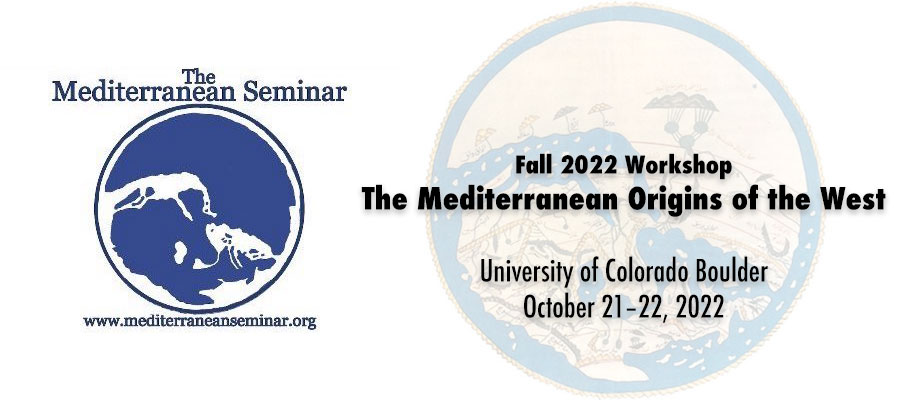The Mediterranean Origins of the West, Mediterranean Seminar Fall 2022 Workshop, University of Colorado Boulder, October 21–22, 2022
The Mediterranean Seminar and the CU Mediterranean Studies Group is seeking proposals for papers to be workshopped and for round-table participants for the 2022 Mediterranean Seminar Fall Workshop to be held on the campus of the University of Colorado Boulder, 21 & 22 October 2022.
The origins of the modern West remain controversial. Some continue to see what we refer to as “Western Civilization” narrowly –evolving out of specifically Classical and Christian precursors: the legacy of Greek and Roman Antiquity and “Judeo-Christian” culture – as a “European” phenomenon. Others see the pre-Modern West more broadly, as that zone under the domination of Abrahamic cultures, stretching from the Indus to the Atlantic with the Mediterranean at its center, in which peoples of various European, African and West Asian societies and cultural orientations, including Christians, Muslims and Jews, all contributed to the economic, social, cultural, intellectual and political processes that led to the emergence of Western modernity. This workshop will bring together scholars from various disciplines, periods and areas to discuss the nature of these processes and the interaction of peoples of various ethnicities, religions, cultures and ideological perspectives in the Pre- and Early Modern Mediterranean, how these contributed to the evolution of Western Modernity, and how historians and educators have, or can interpret and present this history.
We seek to explore, inter alia, questions relating to the role of the Islamicate world and of peoples of Africa and West Asia in the evolution of modern science, theology, art and literature; the nature and significance of political and commercial engagement between the Islamic and Christian spheres; the role of gender, class and social affiliations; and the status and role of ethnic and religious minorities in pre-Modern and Modern Mediterranean societies. We are interested in discussing the development of phenomena typically associated with modernity, including slavery, racism, colonialism, and the emergence of nationalisms and national cultures. Historiographical and methodological questions are also important: how has this history been misinterpreted or distorted, what approaches can we use to better understand it, and how can we effectively disseminate it, whether within academia, to the public, or through our teaching?
We seek papers in any relevant discipline or perspective (e.g.: economic, social or cultural history, literature, art history, musicology, philosophy, Classics, sociology, anthropology) from any period, but especially comparative, methodological or interdisciplinary work that employs the Mediterranean as a frame of analysis. The chronological focus is broad – from Antiquity to the present. For the purposes of the workshop, our Mediterranean world is widely construed as including southern Europe, the Near East, North Africa, Arabia & the Red Sea, Mesopotamia and Black Sea & the Caucuses. Graduate students and scholars of underrepresented communities are especially welcome to apply.
You may apply to present a workshop paper and participate in a round-table.
